
A Venezuelan soldier takes cover behind an armored vehicle. For 48 hours he has ducked flying bullets.
By Digital Journal – Patrick Fort and Margioni Bermúdez
Jul 26, 2021
He is not on a battlefield but rather in a suburb of Caracas, the capital of violence-ridden Venezuela which in his own words is “a country at war.”
The scene played out this month in the slum of Cota 905, which shares a name with the gang that runs it with impunity.
It is one of several Caracas suburbs – all of them poor -— lorded over by criminals who terrorize locals largely unhindered in a country in dire economic and political straits.
Amid the turmoil, the gangs have created parallel empires funded by drug trafficking, extortion and kidnapping.
In Caracas, a city of some two million inhabitants, they run the slums with a heavy hand from their comparatively fancy houses in the wealthier, higher parts of the hilly neighborhoods.
The gangsters impose their own law: determine the cut-off time for parties, set visiting hours for outsiders, even resolve neighborly disputes.
They execute people they accuse of being police informants and mete out harsh punishment for those who fail to pay protection fees – called “vaccines” in these parts.
– Armed to the teeth –
On July 7, the powder keg exploded as it does every so often.
In the early morning hours, shots rang out and members of the Cota 905 gang took to the streets ordering inhabitants to stay at home and cautioning police not to enter.
Nobody knows quite what started it.
From the hills overlooking the slum with its dirt roads and precarious homes, the gangsters, known locally as “malandros,” fired at buildings, cars and pedestrians below, from trenches shielded by sand bags.
At the entrance to the slum, AFP was held up by a group of self-styled young “soldiers,” mainly teenagers, armed to the teeth with assault rifles, machine guns, shiny new pistols, full magazines, hand grenades, binoculars and two-way radios, though dressed in civilian clothes.
Others kept watch from the roofs or terraces of nearby buildings.
The youngsters confiscated AFP’s recording equipment, returning it only after a thorough inspection and quite some negotiation.
“We are not thieves…” insisted one.
“We do not want the police here,” he said, explaining the roadblock. “They commit acts of violence here… they should not come here.”
…
Read More: Digital Journal – Life in the crossfire of Venezuela’s slums
…

